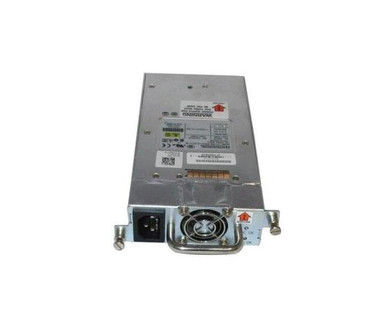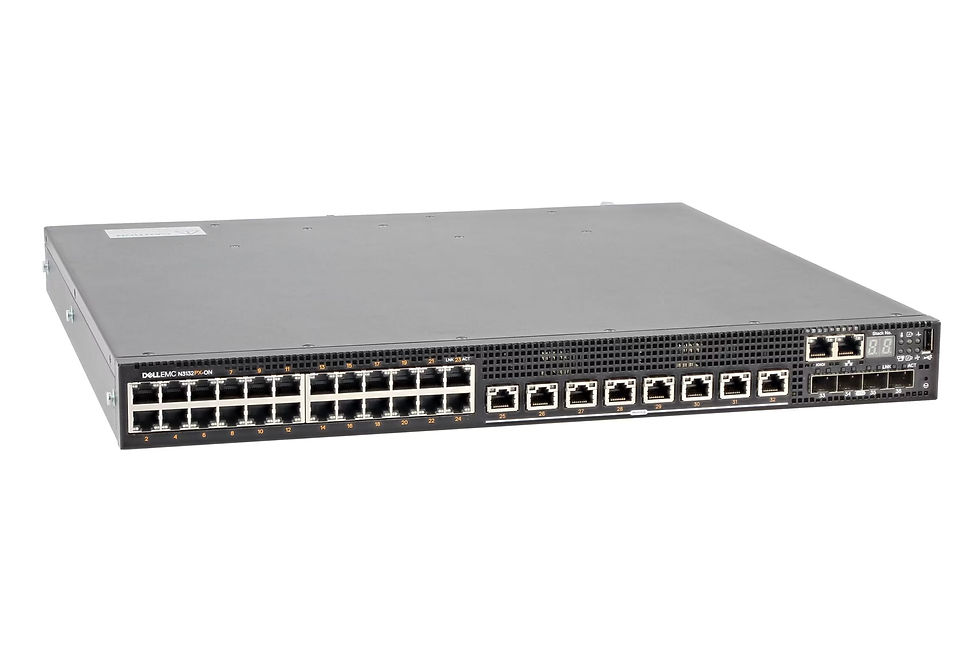Manufacturer: Arista Networks
Part Number: DCS-7280CR3-32D4-FOverview:
The Arista DCS-7280CR3-32D4-F is a high-performance, fixed-form factor data center switch designed for modern, cloud-scale environments. With support for high-density 100GbE connectivity and the advanced capabilities of Arista’s EOS (Extensible Operating System), the DCS-7280CR3-32D4-F is optimized for the most demanding applications, including cloud computing, high-performance computing, and enterprise data centers. It provides low-latency, high-bandwidth connectivity with built-in scalability and resiliency, making it an ideal choice for growing data centers or any infrastructure where performance and availability are critical.
Key Features:
- High-Density 100GbE Ports: Equipped with 32 x 100GbE ports, the DCS-7280CR3-32D4-F delivers industry-leading bandwidth and performance, enabling it to handle large-scale, high-throughput workloads.
- Arista EOS: The switch runs on Arista EOS, a powerful operating system that offers automation, advanced monitoring, and network visibility. EOS simplifies network management and improves operational efficiency in cloud-scale environments.
- Low Latency: Optimized for ultra-low latency, it is perfect for applications requiring quick data processing, including financial services, media streaming, and high-performance computing (HPC).
- Scalability: Designed to easily scale with your growing network demands, supporting multi-terabit throughput and offering port configurations for future growth.
- Flexible Deployment: The DCS-7280CR3-32D4-F is designed to be easily integrated into existing networks, with support for a range of interfaces and architectures, including Ethernet, SDN, and VXLAN.
- High Availability: Built for high availability with redundant, hot-swappable power supplies, fans, and management modules, ensuring reliable network uptime and reducing the risk of downtime.
- Energy Efficiency: With advanced power management features, this switch is designed for efficiency, minimizing power consumption while providing superior performance.
Applications:
The Arista DCS-7280CR3-32D4-F is ideal for a wide range of applications:
- Data Centers: Ideal for modern data centers that require high-density 100GbE connections to meet bandwidth and performance demands for large-scale operations.
- Cloud Providers: Optimized for cloud infrastructure environments, providing flexibility, scalability, and automation for cloud-scale networking.
- High-Performance Computing (HPC): Suitable for applications that require ultra-low latency and high-throughput, such as scientific research, AI workloads, and machine learning.
- Enterprise Networks: Perfect for large enterprises that need to build out a reliable and high-performance network backbone for cloud services and business-critical applications.
- Telecommunications: Used by telecom service providers to manage high-bandwidth and low-latency traffic in demanding environments like 5G networks.
Specifications:
- Ports:
- 32 x 100GbE QSFP28 ports for high-speed data transfer
- Support for mixed-speed configurations (10GbE, 25GbE, 40GbE, 50GbE, 100GbE)
- Performance:
- Switching Capacity: 6.4 Tbps
- Forwarding Rate: Up to 4.7 Bpps (Billion packets per second)
- Latency:
- Optimized for low-latency performance, ideal for applications like financial trading, real-time data analytics, and high-performance computing.
- Redundancy:
- Hot-swappable power supplies (dual, redundant AC or DC options)
- Redundant, hot-swappable fan trays for cooling and reliability
- Software:
- Runs on Arista EOS, offering network automation, visibility, and monitoring features for simplified management.
- Full support for SDN (Software-Defined Networking), VXLAN, and EVPN for advanced network programmability.
- Layer 2 and Layer 3 switching capabilities for robust network design.
- Power Consumption:
- Designed for energy efficiency with intelligent power management.
- Low overall power consumption, optimized for large-scale deployments.
- Physical Dimensions:
- Form Factor: 1RU (Rack Unit)
- Dimensions (H x W x D): 1.75 x 17.4 x 26.4 inches (44.5 x 442 x 670 mm)
- Weight: 16 kg (35 lbs)
- Environmental:
- Operating Temperature: 0°C to 40°C (32°F to 104°F)
- Storage Temperature: -40°C to 70°C (-40°F to 158°F)
- Warranty and Support:
- Supported by Arista’s industry-leading warranty and 24/7 technical support services.
Why Choose the Arista DCS-7280CR3-32D4-F?
- Unmatched Performance: With 32 x 100GbE ports and ultra-low latency, this switch offers industry-leading performance to handle high-throughput, low-latency workloads in cloud and data center environments.
- Scalability: The DCS-7280CR3-32D4-F provides the scalability needed to support growing data center and cloud environments. It can handle multi-terabit throughput and offers flexible deployment options.
- Advanced Network Features: Arista EOS supports automation, monitoring, and advanced features such as SDN, VXLAN, and EVPN, making the switch future-proof and adaptable to evolving networking needs.
- High Availability: Built for continuous uptime with redundant components, the DCS-7280CR3-32D4-F is designed to minimize downtime and improve overall network reliability.
- Energy Efficient: This switch is optimized for energy efficiency, helping businesses reduce operational costs and minimize their carbon footprint while still offering excellent performance.
- Simplified Network Management: Arista’s EOS provides a single platform for automation and management, simplifying day-to-day network operations and enabling greater visibility and control over the network.
- Proven Reliability: Arista is known for delivering high-quality, reliable networking equipment that is trusted by some of the largest enterprises and service providers in the world.
Choose the Arista DCS-7280CR3-32D4-F for a scalable, high-performance network switch that can handle the most demanding applications in modern data centers, cloud environments, and high-performance computing (HPC). With advanced features, low-latency performance, and robust reliability, this switch is built to meet the challenges of next-generation networking infrastructures.














